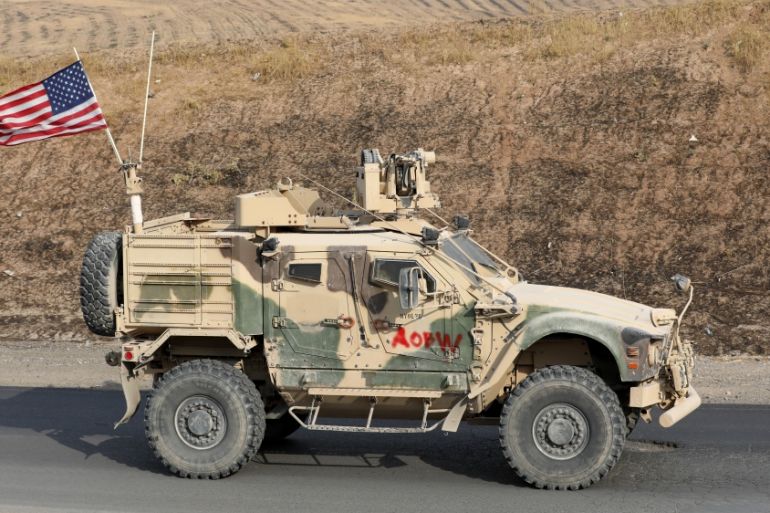Are the US and Iran heading for a confrontation on Iraqi soil?
Analysts say US air attacks against Iran-backed militia in Iraq and Syria could become flashpoint for conflict.

The deadly US raids in Iraq and Syria on Kataib Hezbollah, an Iran-backed militia, could become a flashpoint of confrontation between Tehran and Washington that plays out on Iraqi soil, analysts told Al Jazeera.
On Sunday, the United States attacked three of the group’s bases in Iraq and two in Syria, killing at least 25 alleged members of the group.
The US raids followed a rocket attack on Friday near Kirkuk, that the US blamed on Hezbollah, in which an American civilian contractor was killed and four US service members were injured along with two members of the Iraqi security forces.
Iran has slammed the US attacks on its allied militia in Iraq and Syria, saying the US “showed its support for terrorism”.
Iraq condemned the US attack as a “violation of Iraqi sovereignty”.
In a statement on Sunday, Iraqi caretaker Prime Minister Adel Abdul Mahdi called the move a “dangerous escalation that threatens the security of Iraq and the region”.
Unlike other Iran-backed Iraqi militias such as the Hashd al-Shaabi, which has formal legal and military ties to the Iraqi army, Kataib Hezbollah is directly controlled by Iran’s military and religious leaders, according to Muhanad Seloom, an Iraq expert and assistant professor of critical security studies at the Doha Institute for Graduate Studies in Qatar.
“The latest violence between the US and Iran-backed militias in Iraq signals a serious escalation,” said Seloom.
As Washington and Tehran are locked in various political and military confrontations in the region, especially in the Gulf and Yemen, Friday’s attack, allegedly by Kataib Hezbollah, could be viewed as an Iranian attempt to respond to mounting political and economic pressure brought by the US, argued Seloom.
US-Iran tensions have been rising since Washington pulled out of a landmark nuclear agreement with Tehran last year and began reimposing punishing sanctions.
The latest development also comes amid growing public anger in Iraq against the political establishment, which protesters accuse of widespread corruption and of being beholden to an “invasive” Iranian influence.
Iran, however, claims mass protests were instigated and supported by the US in order to undermine its presence and interests in Iraq.
Iraqi security forces stand accused of killing about 500 people since the start of the movement months ago.
Following the US invasion in 2003 and the toppling of President Saddam Hussein, Iraq has been governed by parties with religious and financial ties to Iran.
“Iran will use its Shia militia proxies in Iraq and elsewhere in the region to attack the US forces and bases in order to fight back the US pressure against it in the region,” Robert Baer, a former CIA intelligence officer who worked in Iraq for several years, told Al Jazeera.
Baer said he does not expect Tehran to back down against the US as it attempts to derail US policies it deems are against the Islamic Republic’s interests.
“Should the US and Iran keep fighting in Iraq in this way, Iran might eventually resort to having US citizens kidnapped in the region, the same way it happened in Lebanon during the 80s,” Baer said. “Given the current political and military conditions in Iraq, the US remains vulnerable there.”
But Abas Aslani, a senior research fellow at the Center for Middle East Strategic Studies in Tehran, dismissed the idea that Iran should be blamed for the latest military attack against the US base in Iraq.
Aslani argued that Iraqi groups act independently and do not follow Iranian commands.
“The Americans want to blame the Iranians for their failure in Iraq, especially after spending billions of dollars on its war efforts but ending up with Iran as the winner in Iraq,” he said.
Aslani said the US is eager to sabotage the Iran-Iraq relationship, because those two countries are on good terms.
US Admiral William Fallon, former head of the US military Central Command which covers Iraq and Iran and the rest of the Middle East as its area of responsibility told Al Jazeera that the latest incident was “another episode of an ongoing struggle” between Iran and the US.
Fallon said while he does not believe Washington or Tehran is interested in escalating the conflict to a higher level of confrontation, “there is no telling where it might” go should other factors on the ground come into play.
“But despite that … the US is not backing down from confronting Iran and its proxies in Iraq and Syria.”
Follow Ali Younes on Twitter: @ali_reports